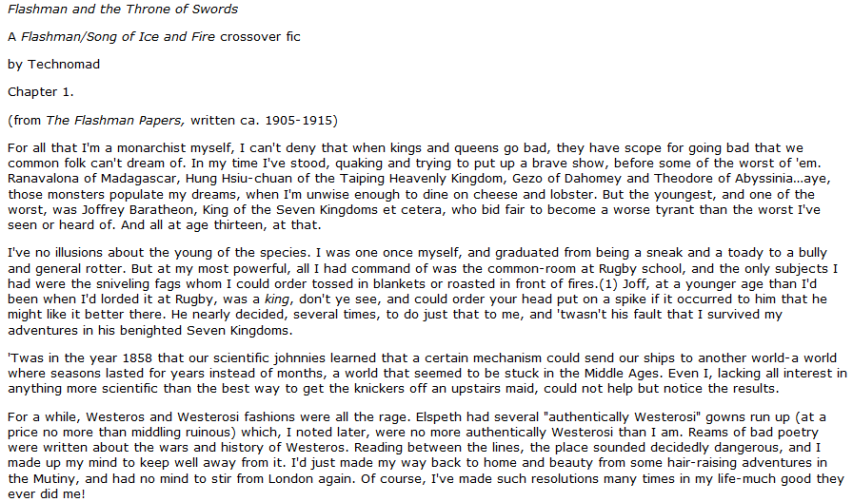The latest anonymous reviewer in Astral Codex Ten‘s “Your Book Review” series considers the work of Michael Baxter and his Real Raw News site, your go-to source of unfiltered unfake news about America:
If you’re a follower of U.S. news outlets, you’ve seen some big stories unfolding over the past year: The unprecedented four criminal indictments lodged against former President Trump. The ongoing AI explosion. The backlash against “DEI”, “woke”, and “cancel culture” as exemplified by Elon Musk’s purchase and rebranding of Twitter to “X”.
Visit a hundred different news sites, and you’ll get varying takes on these stories. Some will be liberal, some centrist, some conservative, some libertarian or neoreactionary or third-way or whatever. Most will attempt or feign objectivity (most badly). But all will largely be discussing the same stories.
And then there is one site where a very different narrative is unfolding:
The admiral and several other officers were already in position when guards delivered [Merrick] Garland to the gallows at 10:05 a.m. He was led to the platform where the hangman and a rabbi awaited his arrival, one lowering the circle of rope and the other asking whether Garland wanted prayers recited as he transitioned to the afterlife.
“Go f*** yourself,” Garland told the rabbi.
Admiral Crandall asked Garland if he had any last words—besides insulting the rabbi.
“I do, Crandall,” Garland said.
A lengthy silence followed.
“We don’t have all day,” the admiral said.
Garland sneered. “You’re so far up Trump’s ass I can see the soles of your shoes.”
“Clever,” the admiral said.
The hangman put the noose around Garland’s neck and a cloth sack over his head.
“Let’s do it,” the admiral said.
The floor beneath Garland’s feet fell away, and he dropped. His neck snapped, ending his miserable life.
Ladies and gentlemen, welcome to Real Raw News.1
The World According to Michael Baxter
Some people write fanfics about Harry Potter. Some people write fanfics about Buffy the Vampire Slayer. And then, well, some people write fanfics about Donald Trump.
Spewing forth from a single WordPress site that doesn’t even display properly in mobile, Real Raw News presents itself as the lone bastion telling the real story of what is going on in America, for everyone who isn’t fooled by the fake news of all the other media outlets.
The articles of RRN are all the work of one Michael Baxter, and after enough time spent reading the site, one realizes that Baxter is no crank – he is instead a creative genius, the Michelangelo of fake news. Just as Michelangelo took four years to paint the Sistine Chapel ceiling, Baxter has spent three and a half building his own elaborate world of plots, counterplots, and bloody, implacable justice.
At Real Raw News, Donald Trump is still president – just a temporarily embarrassed one, who has had to abandon the public-facing side of his job in order to lure the “Deep State” out of hiding into its own annihilation.
In the world of Real Raw News, at least, it’s working. In this corner of the World Wide Web, America is going through a revolutionary purge rivaled only by the worst excesses of Joseph Stalin’s government – with the important difference that this time, the perpetrators thankfully all deserve it.
The basic summary of the past four years of world history, according to RRN, are as follows:
- Following widespread and blatant fraud in the 2020 election, endorsed as legitimate by the media, Donald Trump pretended to surrender power to Joe Biden. In reality, though, he retained the support of the U.S. military, and continues to exercise presidential power from a secret bunker at Mar-a-Lago.
- Military forces loyal to Trump, empowered by the Insurrection Act and other executive orders secretly placing the country under martial law, have been conducting special forces operations to hunt down and secretly arrest various high-profile Americans on charges of treason.
- Joe Biden, who is not really president and perhaps not really Joe Biden either, is somehow still exerting dictatorial powers over much of America, assisted by Deep State-aligned government agencies like the IRS, the FBI, and of course, FEMA. Any time there is a natural disaster, Trump-loyal military forces do battle with FEMA operatives. These battles have killed hundreds.
- A chief goal of Biden’s not-really-in-power dictatorship is spreading Covid-19 vaccines, which are an evil plot to do … something. They contain ingredients like the “zombie drug” scopolamine, pesticides, HIV, and wasp venom. Vaccines variously cause heart attacks, mass sudden death, or berserker rage.
- Vladimir Putin launched the war in Ukraine to hunt down a network of child-trafficking pedophiles. The Deep State has some kind of weird plan to merge America with Ukraine.
- The lack of evidence that all this is happening is entirely explained through coordinated media silence as well as the widespread use of body doubles and clones.
The heart of Real Raw News, and the source of most of its entertainment value, is its accounts of the supposed secret military tribunals occurring at America’s Guantanamo Bay Naval Base in Cuba, better known as Gitmo2. For more than three years, the site has produced one article after another describing the arrest, trial, and execution of dozens of major and not-so-major figures in American life.
1. “Wait a minute, this is about a fake news website? Why is it in this contest?”
Excellent question! To that, I offer several answers:
- A collection of fake news blog posts may as well be considered a long-running series of short stories, and I hope that we’d be allowed to review the collected short stories of an author even if they were never technically compiled into a book.
- Scott told us to be less conventional in our choices.
- I am a liberal arts graduate and I’m definitely not going to make the finals reviewing some nerdy non-fiction book.
2. Baxter also places a few tribunals in Guam.






